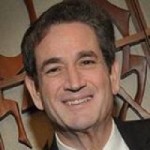By Rabbi Ben Kamin

OCEANSIDE, California — My father, unrealized, died forty years ago today.
It was forty years ago today, March 2, 1976: he dropped dead and left no real trace of personal history. He was just 45 and painfully unrealized.
I keep a graying, wood-framed picture of my long-departed father on the mantle. The image is from 1948: he was, unlike me, mustached, and, in this wartime photo, muscular, hoisting a rifle, in army khakis, and bearing a military posture.
I experience a sickening thud in my chest for an instant –I can actually feel the unnerving sensation of my heart bleeding inside of me. Dad! Leaning against the shelves, I suppress a guttural call to my dead father, almost dizzy from the pounding grief of my lonesomeness and displacement.|
For a few moments, as my hands tremble, I wish I could speak to him. A tragically unfulfilled man, he exited the world suddenly, felled by a massive heart attack in 1976. He tempted fate after a prior attack, defying doctors’ orders by continuing his handball games without telling my mother. There was some rebellion in that, I know. Against her and against his standoff with life.
My eyes now sting with tears. I have to pull myself together and face the day with dignity. But I can’t stop the images playing in my head as I remember the unbearable grimness of his death.
It was so glaringly public: his body lay under a coroner’s covering in a handball court of the Jewish Community Center in Cincinnati. His sneakers emerged from beneath the sheet on the polished hardwood floor, his face concealed, bloodstains above the area of his left eye where he and his eyeglasses had crashed against the floor.
Dad, did you perhaps want to die? I miss him even though it was always a shadow I followed when it came to placing him. Who are you, Dad? Where are you?
My father made being an acknowledged American immigrant into a performance art just as I once did the same in postulating myself as the accepted rabbi of blue-blood elites. Maybe I could have derived some strength from his brash if mercurial persona, his beefy panache, his poetic somberness that drew people to him even if they did not understand him. I’ve longed for an advocate, a relation, a champion, a parent.
Then I realize with a sinking thud: really, what could he have done for me? He was, in his short and decidedly unfinished life, a well of discontent and a dark drop of contradiction. He put on a sophisticated charisma that belied a stormy interior. My father, so intellectually nimble, was nonetheless the elusive receptacle of my adoration.
His mouth was a wound that betrayed the mourning of his ailing heart. His Hebrew-cadenced perfect English drove his own ears crazy. He wanted to sound like a real American. He could not brush away the ancestral squalor of his life in early, dusty Israel. He was never comfortable in his own skin; I have managed to overcome this spiritually-genetic hardship.
I wipe my eyes with a handkerchief and turn away. My dad is dancing in my head incessantly: he is listening to his recordings of Herb Alpert and the Tijuana Brass, waving his hand in a conductor’s gleeful pantomime. He learned the culture of baseball as assiduously as he mastered aerospace engineering, yearning for the approval of his homegrown friends and coworkers.
He could never settle into a firm identity and, I confessed to myself, he would have hardly lasted in this position of mine- a rabbi and community leader. It requires diplomacy and at least a projection of beneficence. To be a rabbi is to be cheerful even when you are in agony. To be a father, for my immigrant Dad, was to be in agony even when he was cheerful.
I do hope to see you in heaven, Dad; there is much to say.
*
Rabbi Kamin is an author and freelance writer. He may be contacted via ben.kamin@sdjewishworld.com Comments intended for publication in the space below must be accompanied by the letter writer’s first and last name and by his/ her city and state of residence (city and country for those outside the U.S.)